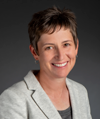 Written by Dr. Katie Ehlman, Director of Gerontology and Director, Center for Healthy Aging and Wellness
Written by Dr. Katie Ehlman, Director of Gerontology and Director, Center for Healthy Aging and Wellness
Education is the theme of the third issue of bOLDer People. When I think about education, my mind jumps to learning. Learning is active, and with learning comes a spirit of agency. We are all capable of learning no matter our age.
Education can be acquired in many different ways. For instance, a person can attend a traditional university setting. Another can design and perform a scientific experiment. And other people may watch a how-to video on YouTube. Without a person’s willingness to learn, the value of education is limited.
USI’s mission includes the words “lifetime learners.” I can see examples of this learning at USI when I look into the USI classroom and notice the traditional USI students who are committing to continuing their learning with a post-secondary degree. I see it when I advise non-traditional students who are choosing to continue their education as adult learners. I see it in the work of the GWEP, as much of our programming revolves around offering learning opportunities for caregivers, future health care professionals, providers and people living with chronic diseases.
Educational offerings, like those mentioned above, create opportunities for learning.
The value of traditional educational offerings cannot be diminished, but I can’t help thinking about the informal opportunities for learning that happen across the lifespan. In a moment of reflection, my mom, who just turned 80, shared with me how she continues to learn, especially when she connects with new and different people. My mom’s thoughts are in line with the 2022 World Health Organization report on Optimizing Brain Health Across the Life Course where “Learning and Social Connection” are listed as one of the five brain health determinants to optimize greater well-being. Our personal interactions create opportunities for learning about each other and ourselves. We’re all lifetime learners.

